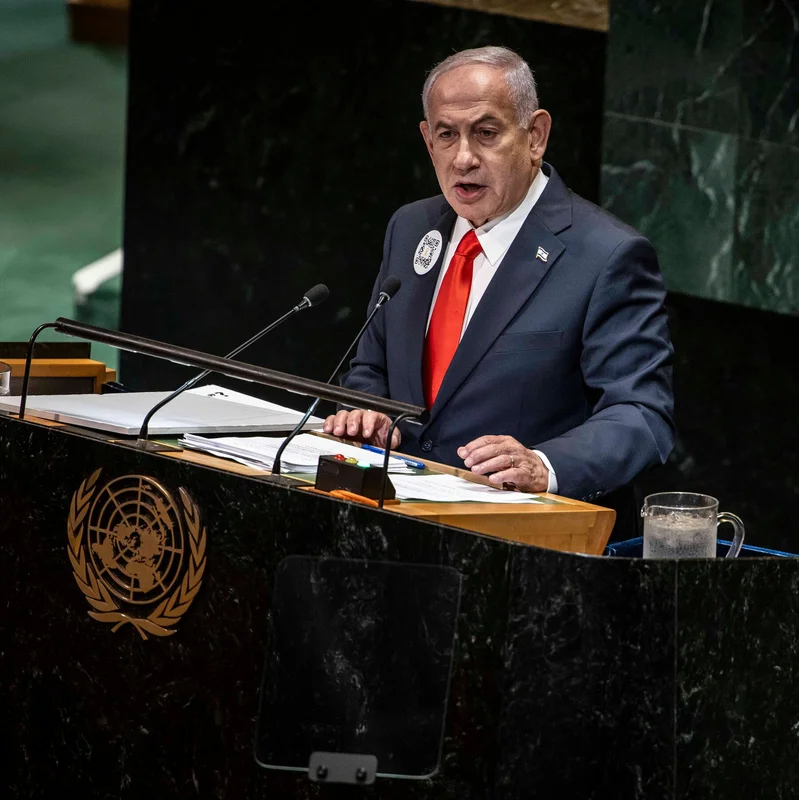On September 26, 2025, Israeli Prime Minister Benjamin Netanyahu delivered a fiery address to the United Nations General Assembly in New York, defending Israel’s military campaign in Gaza and **outright rejecting the establishment of a Palestinian state**. His speech—broadcast via loudspeakers into parts of Gaza—triggered a dramatic walkout by diplomats from dozens of countries, underscoring deepening global divisions over the war’s trajectory .
A Speech Met With Silence—and Departures
As Netanyahu took the podium, representatives from over **40 nations**, including members of the Arab League, the African Union, and several European states, exited the General Assembly hall in protest. The walkout was one of the largest in recent U.N. history and reflected mounting international frustration with Israel’s conduct in the 15-month-long conflict .
⚠️ Key Quote: “There will be no Palestinian state—not now, not ever—so long as I am prime minister,” Netanyahu declared, drawing immediate condemnation from the U.N. Secretary-General and regional leaders.
What Netanyahu Said—and Why It Matters
Netanyahu’s 25-minute address centered on three core messages:
- 🛡️ Defense of military operations: He claimed Israel’s actions in Gaza are “necessary and proportionate” to eliminate Hamas.
- 🎙️ Direct appeal to hostages: Using loudspeakers along Gaza’s perimeter, his speech was broadcast into the enclave so hostages could hear him say, “We are coming for you.”
- 🚫 Rejection of Palestinian statehood: He argued that a sovereign Palestinian state would become a “launchpad for terror,” reversing decades of Israeli diplomatic ambiguity.
Global Reactions at a Glance
The international response was swift and sharply divided:
| Region/Country | Reaction | Key Statement |
|---|---|---|
| Arab League | Condemnation + Walkout | “A rejection of peace and humanity” |
| European Union | Mixed | France called the speech “unhelpful”; Germany urged “caution” |
| United States | Supportive | “Israel has the right to defend itself” – White House spokesperson |
| African Union | Walkout | “Undermines two-state solution and U.N. resolutions” |
Why the Loudspeaker Broadcast Is Controversial
For the first time in U.N. history, a leader’s speech was simultaneously broadcast into an active war zone. Critics argue this:
- Violates norms of diplomatic decorum by using the U.N. platform for psychological operations
- Risks endangering hostages if Hamas perceives them as listening
- Blurs the line between political messaging and wartime propaganda

Diplomats from dozens of nations walk out during Netanyahu’s address at the U.N. General Assembly. (Credit: The New York Times)
What Comes Next?
Netanyahu’s stance complicates U.S.-led efforts to revive ceasefire negotiations and secure the release of remaining hostages. With over 100 hostages still unaccounted for and humanitarian conditions in Gaza deteriorating, pressure is mounting for a diplomatic breakthrough .
Meanwhile, the U.N. Security Council is expected to hold an emergency session later this week. Observers note that Netanyahu’s speech may galvanize support for a new resolution demanding an immediate ceasefire—though a U.S. veto remains likely.
🕊️ For Peace Advocates
Netanyahu’s rejection of statehood is seen as a major setback to the two-state solution.
🛡️ For Israeli Security Hawks
The speech reaffirms a hardline stance against concessions under fire.
For deeper context on the conflict’s humanitarian toll, explore [INTERNAL_LINK:gaza-humanitarian-crisis-2025]. And for official U.N. proceedings, visit the U.N. General Assembly 79th Session page.




